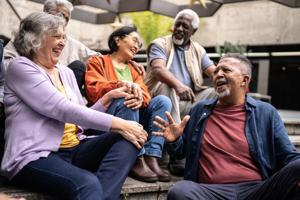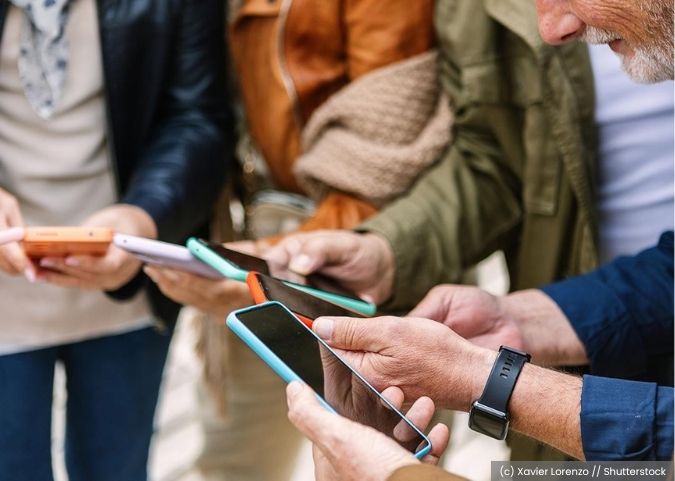
The states aging fastest and what it means for communities
January 26, 2026

Written by: Chris Compendio
Although older adults did not grow up with tablets, smartphones, and wearables, an increasing number have embraced the latest consumer technology. According to the Pew Research Center, around 4 in 5 adults aged 65 and older owned a smartphone in 2024, indicating a shift in their adoption of smart devices.
Technology can help older adults perform everyday tasks and monitor and maintain their health. Common devices like medical alert devices and electric wheelchairs can assist older adults, but apps on smart devices can also serve a number of helpful functions, such as reminding users when to take their medications or allowing them to connect with health care professionals and family members.
Researchers at Saint John Regional Hospital in New Brunswick conducted a 2020 survey of app use in adults aged 60 and over. About 3 in 4 (76%) respondents said they would be interested in using an app to help them improve their health. Most survey participants specifically expressed an interest in using apps to talk to pharmacists and review their medications.
Several other types of apps can help older adults manage some of the changes they may face as they age, including memory loss, limited mobility, and weakened hearing or vision. Some apps provide the user's GPS location to loved ones in case urgent help or emergency services are needed. In contrast, common messaging apps like Facebook's Messenger and WhatsApp allow older adults to stay connected with family and friends. Other apps can provide reminders about their schedules and prescriptions, while some offer engaging puzzles and problems for fun and entertainment and to support their mental health.
QMedic curated a list of the types of apps that can benefit older adults using academic research and an AARP survey.
MEDICAL ALERT SYSTEMS FOR PROFESSIONAL CAREGIVERS
Learn about this Medical Alert System and find out if it’s right for your clients’ needs.

Apps like Life360 use phone signals and GPS location information to allow family members and other trusted individuals to locate each other. Life360 developers tout the app's focus on safety, especially for older adults who may have health concerns or limited mobility. With Life360, users can see the locations of their older loved ones (with their consent, of course) at any time to make sure they are safe. Apple smart devices have the Find My app, which boasts similar functionality. Other third-party tracking apps include FamiSafe and Find360. For older adults who find smartphone technology challenging, Life360 also makes Jiobit, a smart tag location monitor with an alert button and an emergency dispatch function, designed to be worn or carried.

Managing several daily and weekly medications is a challenge for anyone, but older adults may appreciate apps like Medisafe, MyMeds, and EveryDose that provide scheduled medication reminders. With smartwatch integration, Medisafe also allows users to track several health metrics, such as cholesterol levels, weight, and heart rate. For older adults, it may be harder to keep track of several medications, so medication reminders can be useful for them or their caregivers.
FIND A MEDIC ALERT DEVICE FOR YOU
Explore award-winning medic alert devices and 24/7 support for an extended care team that’s with you every step of the way.

Older adults who are also tech-savvy could consider one of several "brain training" apps. Lumosity, for instance, is a popular "brain training" app with games focused on mental tasks like problem-solving and task switching. While there is limited evidence that brain training games can stop or slow cognitive decline in older adults, they can still provide fun and entertainment. Older adults can also find various apps with popular games and puzzles like crosswords and word searches.

As we age, it is important to maintain physical health through diet and exercise, and some apps provide helpful physical health guides. One example is SilverSneakers GO, a fitness app that provides older adults with workout programs, including videos and a scheduling system. With SilverSneakers GO, users can take virtual classes from the comfort of their own homes. AARP also has a program and mobile app called Staying Sharp, which offers a selection of games alongside lifestyle advice on healthy eating and staying active. The app is available to adults 65 and older participating in select Medicare plans. Other general fitness apps like MyFitnessPal and MapMyWalk are also popular choices.
COUNTRY-WIDE MEDIC ALERT COVERAGE
Discover how a medic alert bracelet with GPS could save your life with a range across the USA.

A sense of purpose and connection is important at every age, but these needs are amplified as we age. Socialization and volunteering have been shown to improve physical health, combat loneliness, and reduce symptoms of depression in older adults. For those seeking meaningful interactions, Stitch—a social community for people over 50—has a mobile app that brings people together around shared interests, travel, dining, and dating. The Hank and Wyzr Friends apps offer similar outlets. Looking to make a difference? Though not a dedicated app, AmeriCorps Seniors provides volunteer opportunities for older adults who want to be foster grandparents, companions for older adults, and more.
Story editing by Natasja Sheriff Wells. Copy editing by Paris Close.